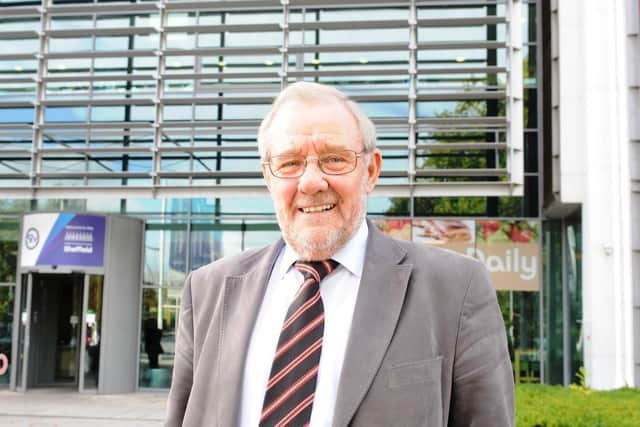Former Sheffield MP and Minister for Sport calls for an end to foreign ownership in English football amid European Super League plans
and live on Freeview channel 276
Richard Caborn, who oversaw sport in the UK between 2001 and 2007 and represented Sheffield Central for the Labour Party from 1983 to 2010, joined a long list of people criticising the plans – and cast doubt over whether they would go ahead amid such a strong backlash.
The Premier League’s ‘big six’ are among 12 clubs who have agreed to join a new multi-billion dollar midweek European Super League (ESL) “to save football” by bringing in new investment, according to Real Madrid president Florentino Perez, who has been made president of the competition.
Advertisement
Hide AdAdvertisement
Hide AdCritics have accused those involved in the biggest reshaping of the sport in decades of greed and pursuing self-interest, however.


Mr Caborn said: “The government ought to revisit the ownership issue of football clubs in England. We ought to look at the German model which limits foreign ownership to below 50 per cent.
“Also, if they want to run it as a business, they should be treated as a business. Sport in this country is in a very privileged position because it doesn’t come under the normal rules of business, it’s always seen as a special entity in it’s own right.
"That’s OK as long as it’s used for the betterment of the game. What they are proposing to do is to use football clubs purely for commercial gain. Football clubs are not businesses, they are much more important than that in society’s social fabric.”
Advertisement
Hide AdAdvertisement
Hide AdGermany’s 50+1 ownership rule means that clubs – and, by extension, the fans - hold a majority of their own voting rights. This means private investors cannot take over clubs and potentially push through measures that prioritise profit over the wishes of supporters.
Bundesliga giants Bayern Munich have confirmed they have said no to the Super League.
"I'm not against foreign investment, I'm against foreign ownership,” Caborn continued, ”if people want to invest it something that's fine.”
Boris Johnson has told the football authorities that he is prepared to introduce new legislation to prevent the formation of a European Super League.
Advertisement
Hide AdAdvertisement
Hide AdMr Caborn said he was made aware of similar plans for an ESL involving 14 top teams from across the continent during the period from 2005 to 2006 when he was sports minister.
A former top football executive also told The Star: “The super league has been on the go for years. Now it’s got so big, who knows?”
When asked whether or not he thought the ESL would still go ahead, Caborn replied: “Not now I don’t. If you had asked me on Sunday night (when official confirmation arrived), possibly. But I can’t see it happening now, absolutely not. I think they have totally misread it.”
The Football Supporters Association, which represents fans in England and Wales, said the plans were “motivated by nothing but cynical greed.”
Advertisement
Hide AdAdvertisement
Hide AdA spokesperson said: “This competition is being created behind our backs by billionaire club owners who have zero regard for the game’s traditions and continue to treat football as their personal fiefdom.”
Downing Street said the PM expressed “solidarity” with supporters and said they should be at the heart of any decisions about the future of the national game.
“It would be highly detrimental for fans,” added Caborn. “Once you allow those monopolies and cartels to operate then eventually the customers get the burn of it. In this case, the customers are the fans.
“Football clubs are tied to their community. Fans want to see them operate within the community, not be divorced from it.
Advertisement
Hide AdAdvertisement
Hide Ad“It's greed, that's what it is. At the end of the day the only people that pay for that are the fans, whether it's shirts or going through the gates.
“If you look at the history of Sheffield United, they are part of our community, they are not a commodity. They are part of the social infrastructure and productivity of the city relies on it.
“Sometimes, when I worked in the steel works, people were more susceptible to being positive if they [United] won. That does illustrate that a city is feeling bloody good if its team's doing well.”
Perez, the only official involved in the plans to speak in favour of them publicly, argued: "Whenever there is change, there are always people who oppose it.
Advertisement
Hide AdAdvertisement
Hide Ad"Soccer has to evolve, like life, like companies, people, mentalities do."
He claimed the move had been made because young people are "no longer interested in football" because of "a lot of poor quality games".
Clubs involved in the Super League – which is due to have a total of 20 competing sides – are expected to receive a welcome bonus of more than 200million euros.
Similarly to American sport franchises such as the NFL (American football) and the NBA (basketball) there would be no relegation from the ESL – but five teams would qualify annually based on their achievements in the prior season.
Advertisement
Hide AdAdvertisement
Hide AdCaborn said a closed system, rather than the pyramid one currently used in the UK, which includes promotion and relegation, would also be “detrimental” to sport in this country.
“I just think the motivation is wrong,” he added. “We have allowed this to happen and therefore we have got to say: ‘I’m sorry, but the party is over’.”